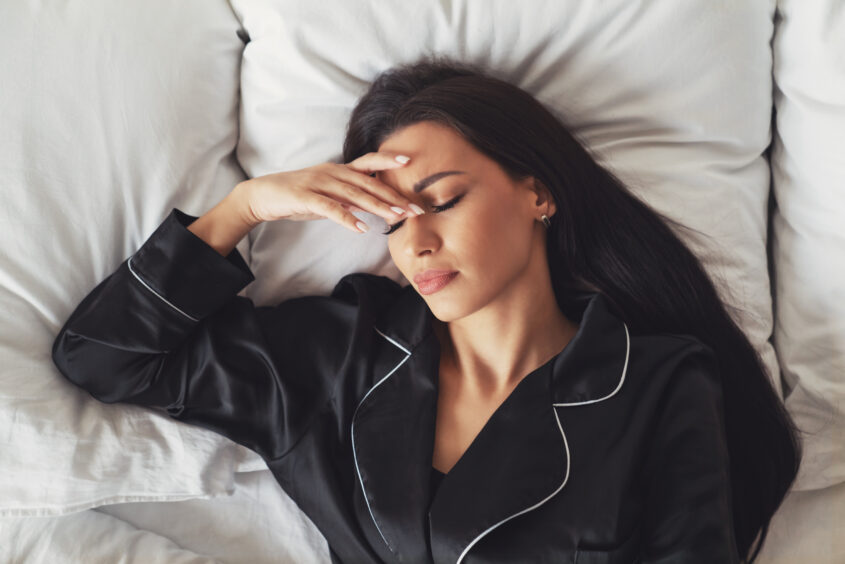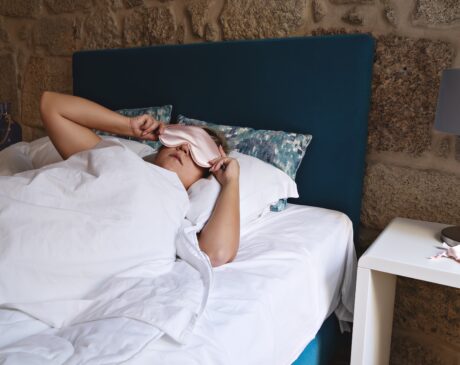Learning to Live Stress Free

It’s getting stressed in here—let’s pull an Elsa and let it go …
High stress is the culprit of a compromised quality of life, and it contributes to lack of sleep and a weakened immune system. One feeds the other, which is why striving for balance and minimizing your levels of stress is so important to self-care.
Nora Tobin, Santa Barbara based performance enhancement and executive coach, nutrition specialist and CEO of Nora’s Naturals Coffee, highlights how stress, sleep and immunity are linked when considering our individual, general wellbeing:
“Stress, sleep and immunity are closely linked. When you miss out on sleep, you miss out on time for your body to recharge and prepare for the next day. In fact, sleep is quite vital for our cardiovascular and immune systems to function properly, as well as our ability to think clearly, learn and retain new information, and manage our emotions. If an individual continuously deprives themselves of getting enough sleep each night, they create more stress that in turn affects their bodies physically and mentally, which in turn affects the immune system, and essentially creates a negative downward spiral,” says Nora Tobin.
Studies have demonstrated an association between inadequate sleep and frequent mental distress, and sleep deprivation causes substantial negative health outcomes. The link between inadequate sleep and frequent mental distress has been viewed historically as a symptom–disease association with sleep inadequacies deriving from preexisting mental distress.
— The CDC, Effect of Inadequate Sleep on Frequent Mental Distress
So, how can optimizing stress, sleep and immunity improve your professional performance?
Here’s what Nora has to say:
“Other than a strong work ethic and a high level of drive, your professional performance too, is connected to your overall health and wellbeing. Practicing healthy habits such as getting consistent sleep and managing your stress, can help you stay healthy and maintain a strong immune system …
… When you get into a healthy, regular routine you will feel more productive and ready to produce high-quality results that you wish to see in your professional life.”

Here are Nora’s top 3 tips for optimizing stress, sleep and immunity:
Stress Resilience Is More Than An Idea + It’s Possible To Strengthen Yours
Result of Stress
When the body is under chronic mental or physical stress, the production of cortisol becomes unbalanced. This leads to excessive fatigue, brain fog and the storage of fat in the abdominal region. In order to produce enough cortisol to keep going throughout the day, the body pulls from the thyroid (lowered metabolism).
Solution to Stress
Guided breathing, vitamin D and adaptogenic herbs balance cortisol (stress hormone) as well as regulates the amygdala- part of your brain that controls anxiety. Try to incorporate one or all of the below on a daily basis.
1-minute Meditation
Take an inhale for 3 counts, hold breath at the top for 3 and exhale for 3. Repeat for 1-minute.
Vitamin D
Precursor to serotonin (feel good hormone) and strong immune defense for the body. Get outside for 10 minutes without sunglasses or try this quality source of Vitamin D daily.
Herbs
Adaptogenic Herbs have been utilized in India for thousands of years and help support the body’s energy and naturally protect against cellular stress. The top-two herbs I utilize to lower stress and anxiety are Reishi and Ashwagandha. Mix into tea or water before bed. Additional support- quality CBD. I love the brand Windward for their clean sleep, stress and energy elixirs.
Getting Better Aquainted with Sleep + Ways to Enhance Yours
Result of Sleep
During sleep, cerebral spinal fluid runs through the brain to clear toxins and create new neural connections crucial for retaining information and slowing down aging. This process is called glymphatic drainage. The glymphatic system primarily works during sleep, so in order to successfully create new cerebral pathways and clear waste products, it is essential to get at least 6 hours of sleep.
Solution to Sleep
Legs up the wall, temperature changes and minerals help the body shift into a parasympathetic nervous system (rest and digest) and out of flight-or-fight mode.
Legs up the Wall
Lying for 5-10 minutes with legs up the wall will reset circadian rhythm and improve the body’s ability to drop into deep REM sleep (reparative/clears brain plaque). Simply lie with legs resting on the wall with feet above hips taking deep breaths.
Change Temperatures
Alternating between hot water and cold in the shower (20 seconds hot, 10 cold) for two minutes before bed will greatly improve the body’s natural ability to regulate its own production of melatonin.
Increase Minerals
Magnesium is easily depleted in a state of prolonged heightened stress. This mineral is a precursor to the neurotransmitter Gaba, which aids in the repair process during sleep. Gaba turns on Theta brain waves, facilitating deep levels of relaxation, healing and rejuvenation. In order to up the levels of magnesium before bed, try Calm. It also comes in travel-size packets.
According to the CDC, one-third of US adults report sleeping less than the recommended amount, and approximately 20% live with a mental illness.
“Poor mental health is common in the US. Nearly 1 in 5 US adults live with mental illness. Furthermore, an estimated 50% of all Americans will be diagnosed with a mental illness or disorder at some point in their life. Mental health illness includes different conditions and symptoms, such as anxiety, depression, stress, and other psychological illnesses. Moderate and severe mental disorders that need psychological treatment require regular visits to a health care provider, thus lowering workplace productivity.
Depression and anxiety alone cost over $1 trillion annually for medications, outpatient and primary care visits, and inpatient care.” In the same study, the CDC and the American Academy of Sleep Medicine emphasized the importance of an adequate night’s sleep (defined as 7 or more hours per night with no upper limit). Anything less than this amount may lead to the development of various chronic diseases.

Understanding Energy + How to Improve It
Result of Low Energy
The body has two forms of energy burning- glucose and ketones. When the body is primarily burning glucose, it goes through rapid spikes in blood sugar, leading to cravings, energy crashes and weight gain. When the body is burning ketones, it’s receiving steady state energy while burning its own fat stores.
Solution to Sustained Energy
Interval workouts, whole foods and eating healthy fat allow the body to burn more ketones for energy without feeling deprived. This leads to rapid cellular turnover, efficient weight loss/management, and high energy levels all day long.
High Intensity Interval Training (HIIT)
Raises post workout oxygen consumption, elevating metabolism for 24 hours post workout. The form of training is suitable for all levels, takes less than 20 minutes and requires no equipment. This allows the body to burn fat much more efficiently and supply adequate energy to the brain. Alternate with days of low intensity training like yoga or walking. (Peloton, Forme, iFit, Asana Rebel)
Increase Anti-inflammatory Foods
Lowering inflammation in the body will optimize and help sustain energy throughout the day, help fight off pathogens and generate rapid cellular turnover. Pick any foods from this list from Harvard Health including berries, apples, citrus and pomegranates.
Incorporate the 8-Hour Eating Window
Shortening the time window of our meals increases autophagy and allows the body to burn ketones (fat stores) for fuel instead of glucose. Eating in this window a few days per week will rapidly increase cellular turnover, boost irisin and enhance cognitive function.
I would always remind myself that any type of failure in business was not death defying- I was not going to be held under in the ocean by a massive wave or have to save someone from drowning.
Nora Tobin, Authority Magazine
The fact of the matter is, failure is part of growth. We have to fail to succeed. But failing our health shouldn’t be part of that sacrifice. Nor should anything that puts your mental health and well-being at risk. At the core of it all is taking better care of ourselves, and it begins with sleep, nutrition and exercise.
In a research paper from the American Psychological Association, they looked closely at the affect stress has on sleep for teens and adults.
Sleep is essential for a person’s health and wellbeing, according to the National Sleep Foundation (NSF). Yet millions of people do not get enough sleep and many suffer from lack of sleep. At least 40 million Americans suffer from over 70 different sleep disorders and 60 percent of adults report having sleep problems a few nights a week or more. Most of those with these problems go undiagnosed and untreated. In addition, more than 40 percent of adults experience daytime sleepiness severe enough to interfere with their daily activities at least a few days each month — with 20 percent reporting problem sleepiness a few days a week or more. Furthermore, 69 percent of children experience one or more sleep problems a few nights or more during a week.
Many report that their stress increases when the length and quality of their sleep decreases. When they do not get enough sleep, 21 percent of adults report feeling more stressed. Adults with higher reported stress levels (eight, nine or 10 on a 10-point scale) fare even worse — 45 percent feel even more stressed if they do not get enough sleep.
Younger Americans (Millennials and Gen Xers) report getting fewer hours of sleep per night on average, and are more likely than other adults to say they do not get good-quality sleep and have more trouble achieving their sleep goals. Younger adults are more likely to say they feel stressed by a lack of sleep (Millennials: 29 percent; Gen Xers: 23 percent) than Boomers (19 percent) and Matures (7 percent). Millennials and Gen Xers are also more likely to report feeling sad or depressed because of stress (Millennials: 47 percent; Gen Xers: 42 percent; Boomers: 29 percent; Matures: 15 percent).
Gen Xers are most likely to say that they sleep fewer than eight hours a night. They are also least likely to say they are getting enough sleep (45 percent vs. 74 percent of Matures, 56 percent of Boomers and 54 percent of Millennials).
Talk to a physician or mental health provider about any sleeping problem that recurs or persists for longer than a few weeks.
Stress is the number one cause of short-term sleeping difficulties, according to sleep experts. Common triggers include school- or job-related pressures, a family or marriage problem and a serious illness or death in the family. Usually the sleep problem disappears when the stressful situation passes. However, if short-term sleep problems such as insomnia aren’t managed properly from the beginning, they can persist long after the original stress has passed.
Drinking alcohol or beverages containing caffeine in the afternoon or evening, exercising close to bedtime, following an irregular morning and nighttime schedule, and working or doing other mentally intense activities right before or after getting into bed can disrupt sleep.
According to the DSM, some psychiatric disorders have fatigue as a major symptom. Included are: major depressive disorder (includes postpartum blues), minor depression, dysthymia, mixed anxiety-depression, seasonal affective disorder and bipolar disorder.

Further studies revealed the impact of sleep deprivation on teens as well. The same study reveals that teens also report that stress has an impact on their sleep and vice versa.
Teens report sleeping far less than the minimum age-based recommendation of 8.5 to 9.25 hours. On average, teens say they sleep 7.4 hours a night on a school night and 8.1 hours a night on a non-school night. Nearly one-quarter of teens (24 percent) also report that their sleep quality is fair or poor.
More than one-third of teens (35 percent) report that stress caused them to lie awake at night in the past month. And for teens who sleep fewer than eight hours per school night, many say their stress level has increased over the past year (42 percent), compared with 23 percent of teens who sleep at least eight hours per school night.
In addition, 18 percent of teens say that when they do not get enough sleep, they are more stressed and 36 percent of teens report feeling tired because of stress in the past month. Thirty-nine percent of teens with higher reported stress levels (eight, nine or 10 on a 10-point scale) during the past school year feel even more stressed if they do not get enough sleep, while only 3 percent of teens with lower reported stress levels (one, two or three on a 10-point scale) during the past school year say the same.
Stress impacts every aspect of our lives. While it’s impossible to eliminate completely, adjusting how we respond in times of stress could be the difference between staying calm or quickly becoming disregulated. Ultimately, it’s important to make yourself — and your sleep and mental health — a priority.
MORE ABOUT NORA TOBIN
Nora Tobin is the Health and Wellness partner to Fortune 100 organizations across luxury hospitality, financial services, technology, and entertainment.
Nora and her teams have scaled global wellness retreats, senior leadership summits, Nora’s Naturals culinary offerings, media campaigns, corporate consulting and wellness voyages on The Ritz-Carlton Yacht Collection.
Nora is the Founder and CEO of Nora’s Naturals Coffee. She is a keynote speaker, Performance Enhancement and Nutrition Specialist, brand spokesperson, model and Executive Coach. She is certified as an advanced Scuba, Cliff, and Helicopter Rescuer, as well as a Del Mar Ocean Lifeguard. Nora has been a contributing editor to SHAPE magazine and Sports Illustrated. She grew up in South Lake Tahoe, California.
STRESS FREE RESOURCES
Aids to help reduce stress in your daily lives.

STRESS
Organic Ashwagandha 2000mg with Black Pepper Extract - Ashwaganda Root Powder Supplement for Adrenal Fatigue, Mood & Thyroid Support - 90 Vegan Capsules

SLEEP
Calm Gummies | Stress Gummies Supplement with Ashwagandha, L-Theanine, GABA, Vitamin B6 & Lemon Balm | Supports Mood, Focus & Stress Relief | Vegan

ENERGY
Super Greens Powder Premium Superfood | 20+ Organic Green Veggie Whole Foods | Wheat Grass, Spirulina, Chlorella & More | Antioxidant, Digestive Enzyme & Probiotic Blends | Vegan Juice Supplement

IMMUNITY
Organic Elderberry Syrup [5000mg Strength] Plus Zinc & Vitamin C Liquid Extract for Kids & Adults - Immune System Support - Vegan Sambucus Nigra Antioxidant Drops Supplement



